As the tide of “strategic reserves” rises, will Bitcoin reshape the “balance sheets” of sovereign states and corporate i
What does it mean to have a strategic reserve asset of 1 million BTC?
According to statistics from the World Gold Council, as of the third quarter of 2024, the Federal Reserves gold reserves totaled 8,133.46 tons (about US$530 billion), ranking first in the world. The current market value of 1 million BTC is nearly US$100 billion, which is almost equivalent to 19% of the US gold reserves!
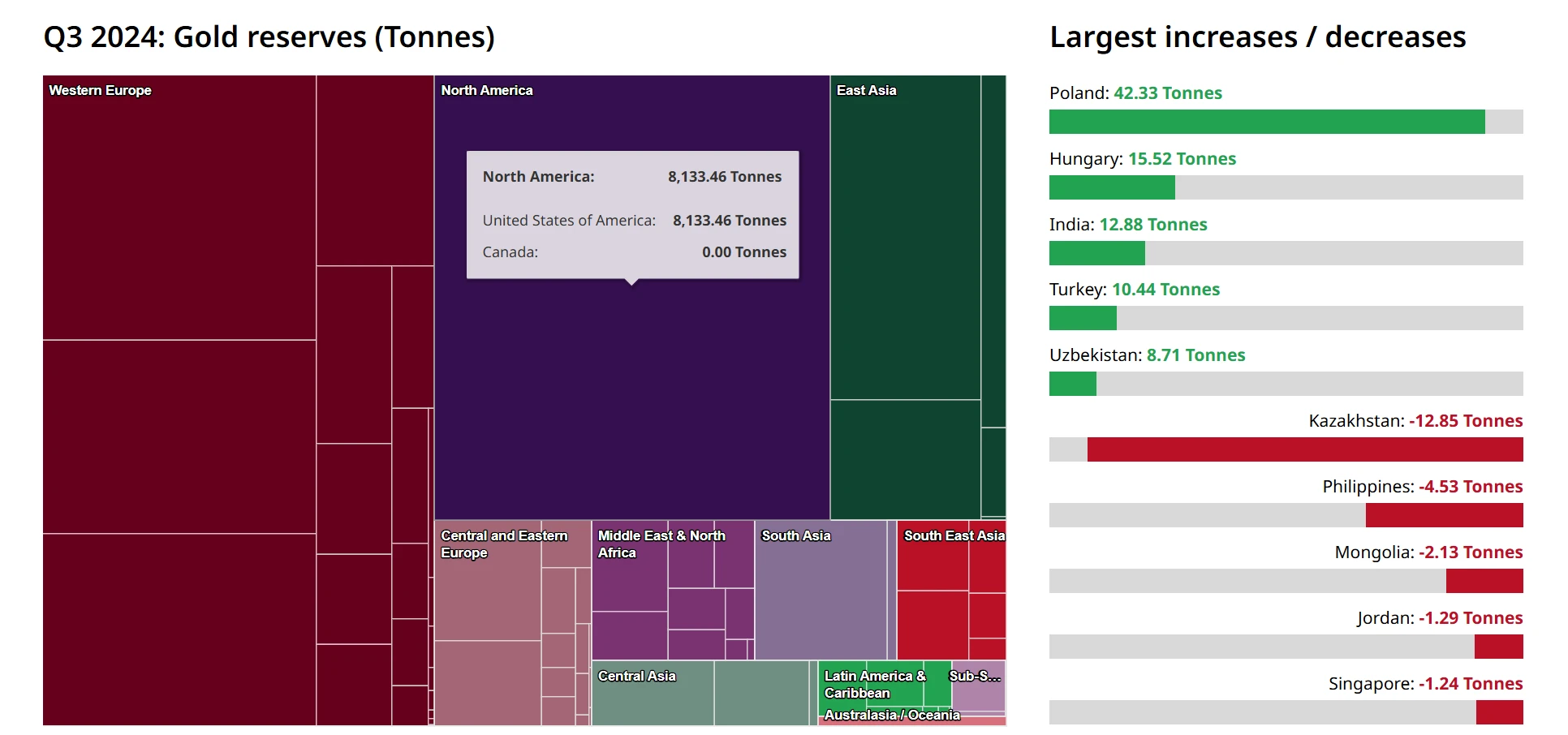
Source: World Gold Council
As Trump and more and more institutions/enterprises and sovereign states begin to consider setting up Bitcoin strategic reserves, will Bitcoins Fort Knox moment come? Can it become part of the global reserve asset system like gold?
The next ten years may be a critical time window for revealing the answer.
What does “strategic reserve assets” mean?
At the Bitcoin 2024 conference held in July 2024, Trump publicly promised in his speech that he would never sell the Bitcoin held by the government and acquired in the future, and insisted on the idea of a strategic Bitcoin reserve.
Now, with Trumps election and the recent appointment of crypto-friendly people to a series of key positions including the U.S. Treasury Secretary, the U.S. SEC Chairman, and the White House Crypto Czar, the U.S.s idea of incorporating Bitcoin into its strategic reserves is undoubtedly one step closer to implementation.
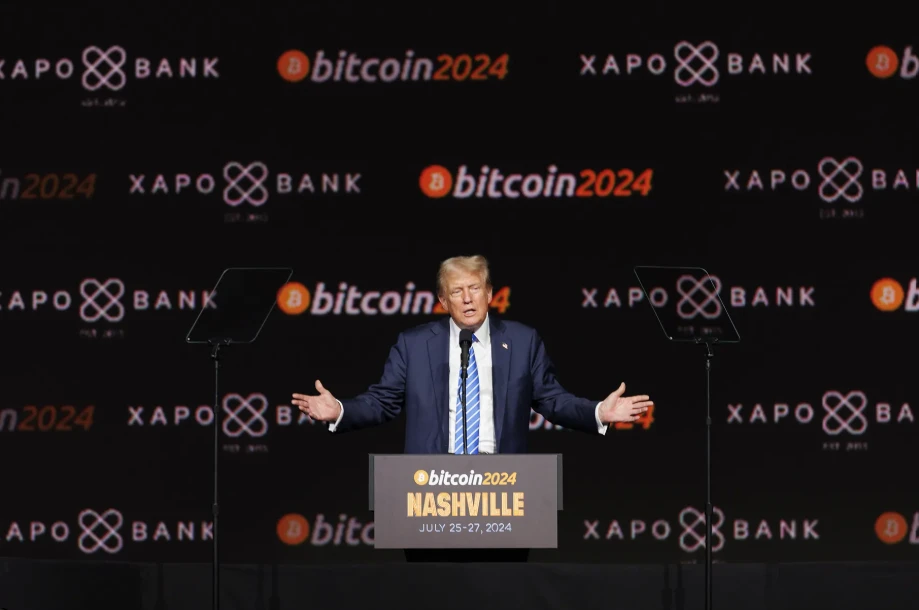
Source: Bloomberg
So what exactly are “strategic reserve assets”?
Simply put, strategic reserve assets are key assets held by national or regional governments, designed to respond to economic fluctuations, financial crises or geopolitical risks, and to maintain the countrys financial stability, economic security and international competitiveness . They usually have characteristics such as high value and universal acceptance, security and stability, and liquidity.
At the corporate level, strategic reserve assets also help companies/institutions achieve financial stability, enhance risk resistance, and support their long-term growth strategies. Especially in periods of economic fluctuations, strategic reserve assets are often the first line of defense for companies against risks.
Traditional strategic reserve assets mainly include:
-
Gold: Widely regarded as a stable store of value due to its scarcity and inflation resistance;
-
Foreign exchange reserves: Reserve currencies, mainly the U.S. dollar, are an important means of supporting international trade and payments;
-
Special Drawing Rights (SDR): allocated by the International Monetary Fund (IMF) to supplement member countries’ official reserves;
This also means that assets that can become strategic reserves must have comprehensive advantages such as stable value, global recognition, and convenient circulation . Bitcoin, as an emerging digital asset, is gradually meeting these conditions and is beginning to be seen as a potential option besides gold.
It is worth noting that in addition to Trump’s promise, on July 31, 2024, U.S. Senator Cynthia Lummis also submitted the BITCOIN Act of 2024 to the U.S. Congress, which detailed that the U.S. Treasury must purchase 1 million BTC within 5 years and must hold it for at least 20 years unless used to repay outstanding federal debt . It even plans to require the Federal Reserve to use a certain amount of net income each year to purchase Bitcoin .
The goal of this plan is to ensure that the U.S. government can hold large amounts of Bitcoin over the next twenty years, providing the country with a long-term financial hedging tool. The bill has been submitted to the U.S. Senate Banking, Housing, and Urban Affairs Committee and needs to be discussed and voted on before being sent to Trump for signature to become law after being passed by both houses.
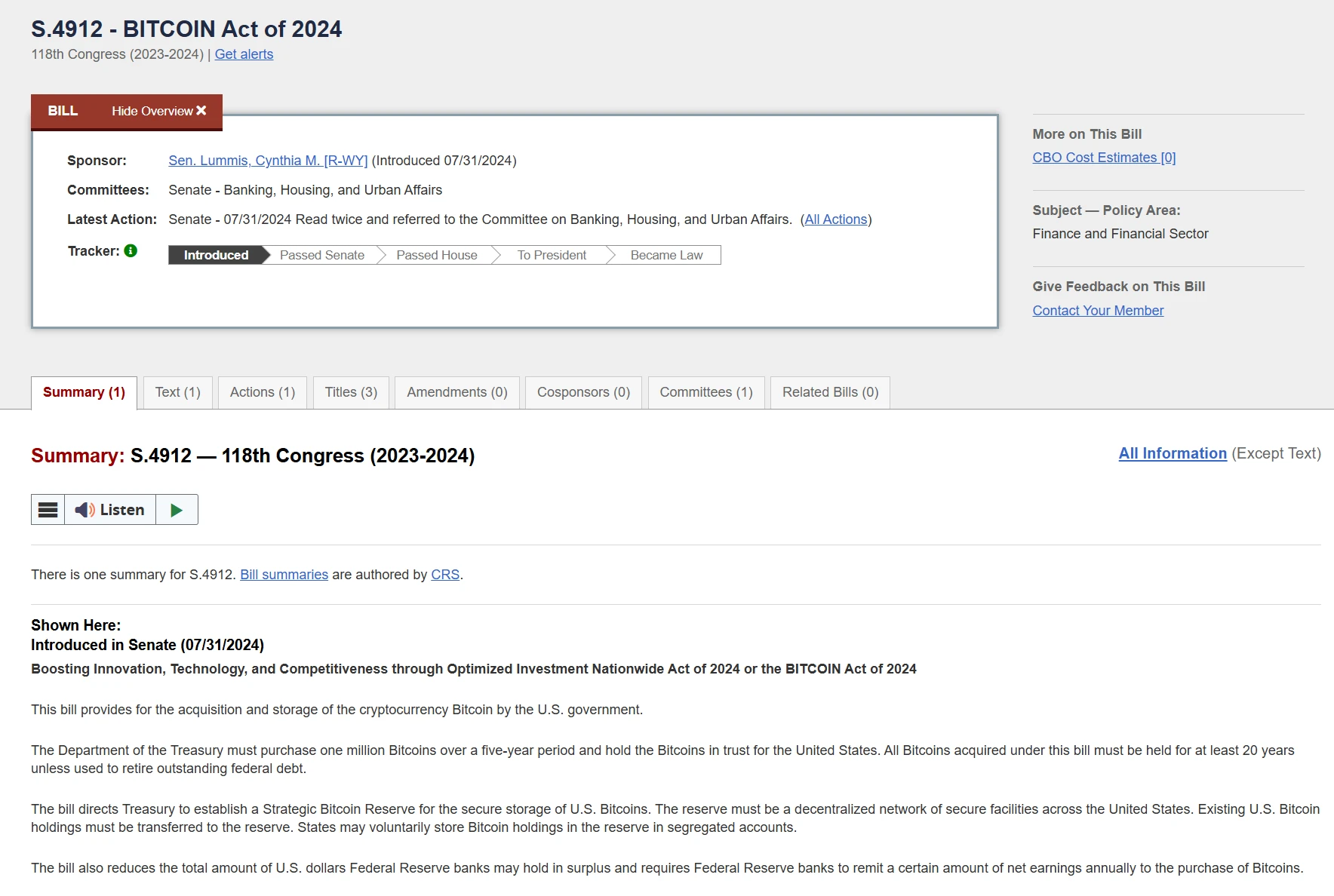
Source: congress.gov
Besides gold and foreign exchange, why Bitcoin?
To some extent, the more gold reserves there are, the better it is not in an absolute sense.
First of all, of course, gold, as a physical asset, has no interest or income, and lacks liquidity income. This is also the main reason why Buffett has always had a negative attitude towards it – gold has no way to pay you interest, so there is no compound interest effect.
More importantly, gold reserves require high storage and maintenance costs. Especially for most countries, how to effectively manage and protect gold reserves has become a financial burden that cannot be ignored. For example, the world-famous Federal Reserves main gold warehouse Fort Knox has invested a huge amount of resources to ensure the safety of gold storage:
Not only is it located deep in the strategic heartland of the United States, Kentucky, but it is also buried deep underground. Not only is it surrounded by thick reinforced concrete walls and all-weather security equipment, but it is also guarded by tens of thousands of soldiers all year round. This makes the storage of gold reserves not only a security need, but also a long-term and expensive financial investment.
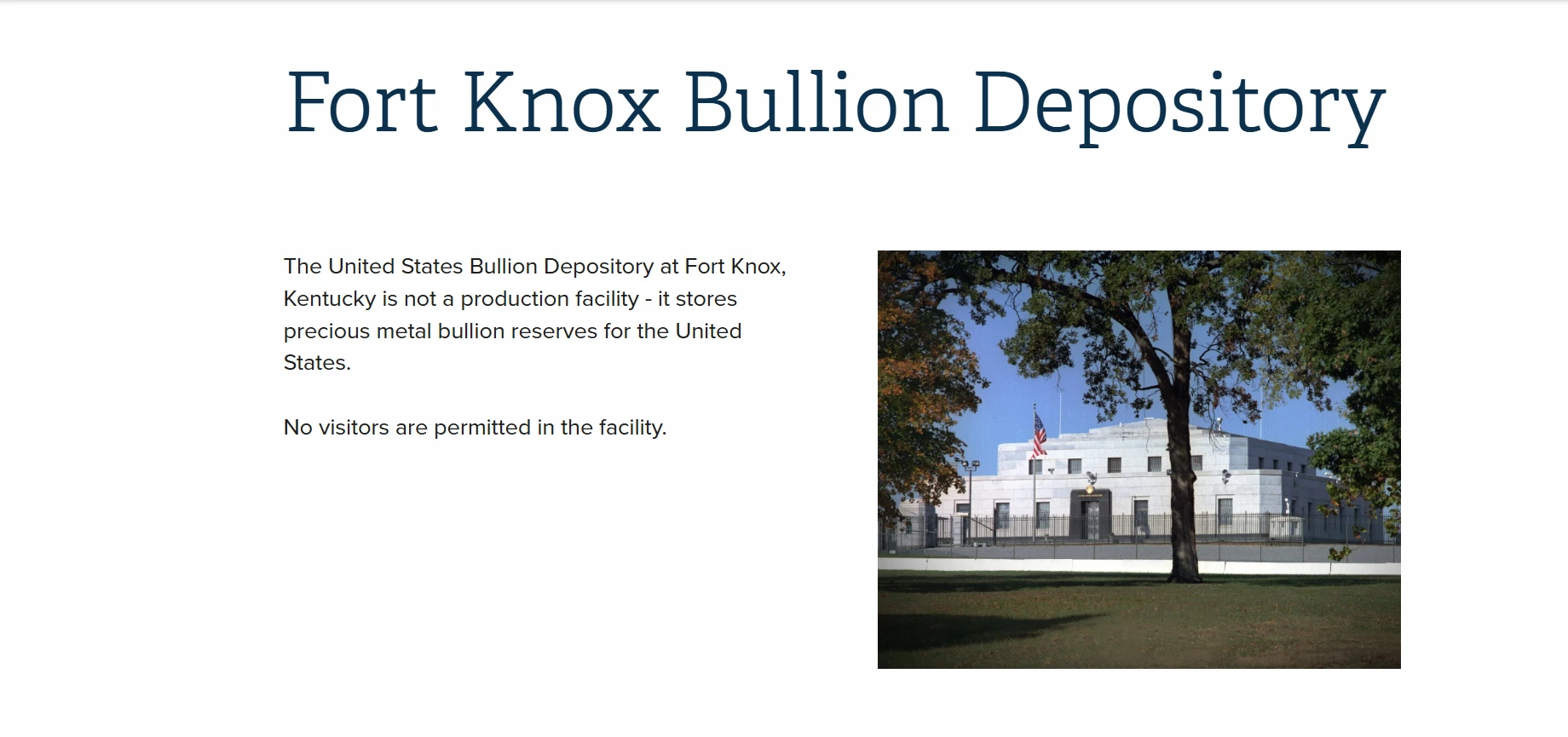
Source: United States Mint
In comparison, the storage cost of Bitcoin is almost negligible. It does not require physical storage space, nor does it require the setting up of expensive protective facilities. It can achieve efficient storage and management by relying on secure wallets, multi-signature technology, and a decentralized network verification system.
Taking the national level as an example, the storage cost of Bitcoin is mainly concentrated in technology and network maintenance, which is much lower than the physical protection cost of gold. This also means that even if Bitcoin does not generate direct income, its holding cost is still significantly lower than gold, which leaves more room for net asset growth.
At the same time, the transaction of physical gold often involves complex processes such as physical delivery, storage, and transportation, which may take days or even weeks. The gold market is usually limited by the trading time and geographical restrictions of the traditional financial system. Bitcoin can be traded through exchanges 24 hours a day, 7 days a week, covering the global market.
In addition to gold, foreign exchange reserves (such as the euro, yen, etc.) are legal tender issued by other countries. Their value not only depends on the economic conditions of the issuing country, but may also be affected by geopolitical risks. The scarcity of Bitcoin is not affected by monetary policy intervention, avoiding the risk of depreciation caused by excessive issuance, and allowing any holder (whether an individual, an institution, or a sovereign state) to freely store, transfer and trade it globally.
This decentralized nature ensures that Bitcoin is not affected by political and economic interference, and its value storage function can still play a stable role even in times of global turmoil.

Enterprises/institutions and sovereign states are becoming BTC pixiu
For this reason, Bitcoin, with a total market value of $2 trillion today, is gradually being seen as a potential reserve tool because it does not require physical storage, has global circulation, is highly transparent and anti-inflationary. More and more companies/institutions and even sovereign states are beginning to explore incorporating Bitcoin into their strategic reserve asset system.
US Government: One of the Worlds Largest Bitcoin Holders
It may be surprising to many people that the US government is actually one of the largest Bitcoin holders in the world. Over the years, the United States has seized a large number of Bitcoins from cyber criminals, money laundering organizations, and dark web markets through law enforcement actions. It still holds about 200,000 Bitcoins, which is nearly $20 billion as of the time of writing.
As the most cryptocurrency-friendly president in U.S. history (at least in terms of public statements), it remains unknown whether Bitcoin will be included in the Federal Reserve asset system in the next four years under Trumps rule. However, what is certain is that the Bitcoins in the hands of the U.S. government may not be sold as frequently as before, but may gradually explore their longer-term strategic significance.

Source: Arkham
El Salvador: Invest 1 BTC daily
El Salvador is the first country in the world to establish Bitcoin as legal tender. It promulgated the relevant bill as early as September 7, 2021, and subsequently launched the e-wallet Chivo, and pre-deposited $30 worth of Bitcoin for each resident who downloaded the wallet. It not only integrated Bitcoin into the national economic system, but also demonstrated its firm Bitcoinization route.
And whenever the crypto market fluctuates violently, Salvadoran President Nayib Bukele often publishes Bitcoin purchase announcements through social media to inject confidence into the market. Currently, El Salvador continues to buy 1 BTC every day. With the support of rounds of bottom-fishing, as of December 10, its BTC holdings have reached 5,959.77, with a market value of approximately US$577 million.
Although this holding is not large on a global scale, as a small economy, this firm Bitcoin strategy is remarkable and provides a unique experimental case for other countries.
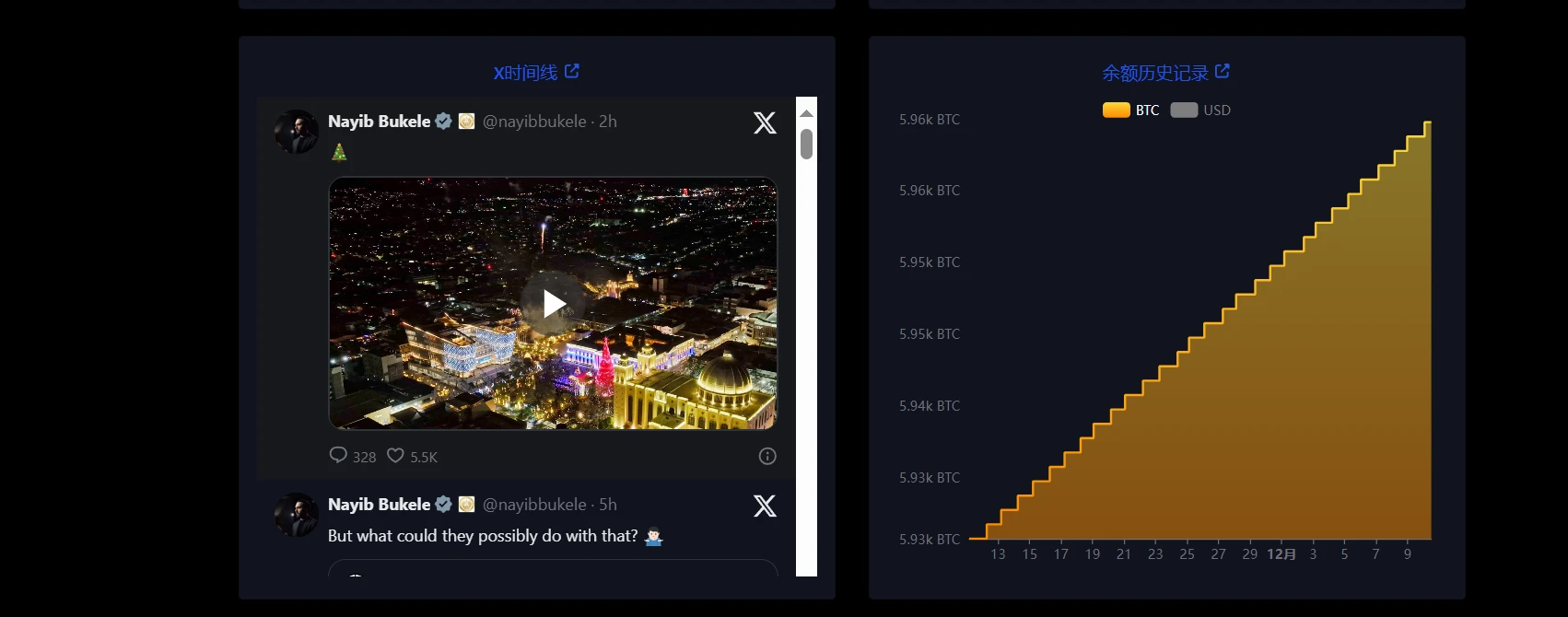
Source: Bitcoin Office
MicroStrategy All in Bitcoin
In addition, outside of a number of sovereign states, the listed company MicroStrategy is undoubtedly the absolute representative in the field of Bitcoin hoarding – buying, buying, buying of Bitcoin has long been an open strategy of big money, and the amount held has long exceeded the reserves of any sovereign state at all public levels.
The news of MicroStrategys public purchase of Bitcoin can be traced back to August 11, 2020, when it spent US$250 million to purchase 21,454 bitcoins. The initial purchase cost was approximately US$11,652 per bitcoin. After that, it began an unstoppable path of increasing holdings. The most recent publicly disclosed purchase was yesterday, December 9, when it purchased 21,550 bitcoins for approximately US$2.1 billion, an average of US$98,783 per bitcoin.
As of December 8, 2024, MicroStrategy purchased 423,650 BTC at a price of approximately US$25.6 billion, at a price of approximately US$60,324 per Bitcoin. Based on the current price of US$97,000, the floating loss on its holdings is approximately US$15.5 billion.
Hodl Bitcoins Tesla
On December 20, 2020, Elon Musk first expressed interest in buying Bitcoin after Microstrategys Michael Saylor suggested other CEOs follow his example. Shortly afterwards, in late January 2021, Musk changed his Twitter profile to #Bitcoin, and Tesla eventually announced the purchase of $1.5 billion in Bitcoin in February 2021.
Tesla then reduced its holdings of Bitcoin by 10% in the first quarter of 2021. According to Musk, this was to test liquidity and prove that Bitcoin is liquid enough to make it a substitute for cash on the balance sheet.
According to Arkham data, as of the time of writing, Teslas bitcoin holdings reached 11,509, with a market value of approximately US$1.1 billion.

Source: Arkham
Other countries and mainstream companies/institutions: Bitcoin reserves are becoming mainstream
It is worth noting that the strategic value of Bitcoin is gradually being transmitted from the national level to the corporate and institutional levels. Although the countrys reserve layout will directly affect the policy environment, enterprises are the main practitioners of adoption. Therefore, Bitcoin is not only a hedging tool, but also gradually becomes a strategic component of corporate balance sheets.
Recently, technology giants such as Microsoft and Amazon have also been actively advocated by investors to include Bitcoin in their balance sheets. MicroStrategy founder Michael Saylor even directly recommended investing in Bitcoin to Microsofts board of directors, believing that this move could significantly enhance corporate value and create long-term returns for the companys shareholders.
At the same time, the National Center for Public Policy Research, a conservative think tank in the United States, also proposed that Amazon should invest 1% of its total assets in Bitcoin, aiming to increase shareholder value in this way and hedge the risk of depreciation of traditional currencies.
From an objective perspective, mainstream institutions and traditional enterprises incorporating Bitcoin into their balance sheets can indeed bring the following multiple advantages to enterprises:
-
Anti-inflation capability: The scarcity of Bitcoin, with a fixed total of 21 million coins, gives it a strong anti-inflation attribute, which can help companies stabilize the value of their assets in an environment of global monetary easing and fiat currency depreciation;
-
Diversified investment portfolio: As an emerging asset class, Bitcoin provides companies with opportunities to enrich asset allocation, reduce dependence on a single asset class, and improve overall financial robustness;
-
Enhance corporate brand and market image: Holding Bitcoin not only reflects the companys support for innovative technologies and future economic models, but also enhances the companys competitiveness in the market and creates a more forward-looking brand image;
However, in the process of incorporating BTC into the balance sheet, companies need to solve two key problems: how to safely custody large assets, and how to efficiently complete OTC (over-the-counter) needs to avoid market shocks.
This makes professional custody and OTC service providers an indispensable part. Take the custody service of OSL, Hong Kongs first licensed exchange, as an example. It designs an independent wallet for each customer and is protected by a bankruptcy-isolated trust structure to ensure the absolute security of the companys/institutions BTC.
In addition, OSL has now partnered with first-tier insurance giants such as Canopius to increase the coverage of the insurance plan to US$1 billion, covering a variety of risk scenarios that may lead to asset losses, including cyber attacks, fraud, technical failures, etc.
As for OTC, as a regulated licensed and compliant platform, thanks to its close cooperation with major banks in Hong Kong, OSL is able to achieve near-instant fiat currency settlement, and deposits and withdrawals are subject to strict mechanisms, greatly reducing the risk of bank accounts being frozen.
Bitcoin in the next decade: speculative asset or global strategic reserve?
Aujourd'hui, Bitcoin has grown from a marginal asset to an emerging candidate for global strategic reserves. From sovereign states to mainstream institutions/traditional enterprises, more and more forces are redéfining its role. Its scarcity, decentralization and high transparency make it widely regarded as digital gold.
Although its price volatility is still a focus of external debate, Bitcoins adoption is advancing at a speed that cannot be ignored. If Trumps idea of strategic reserve assets comes true, BTCs status will undoubtedly catch up with gold, and even its strategic significance will surpass gold:
Although gold is physically scarce, its distribution and trading rely on complex logistics and regulatory systems. Bitcoin relies on blockchain technology and does not require physical storage or transportation, and can achieve rapid and borderless circulation. This feature makes it more suitable as a reserve asset for countries and institutions in the global financial system, and it assumes more strategic responsibilities.
Against this background, in the next decade, Bitcoins potential as a global strategic reserve asset will be fully unleashed, and its application scenarios may also be further expanded.
Whether it is a national long-term hoarding plan or a corporate/institutional buy and hold strategy, Bitcoins global influence is expanding at a rate that cannot be ignored. Global national leaders and globally renowned companies such as MicroStrategy, Microsoft, and Amazon have even become the best promotional role models for Bitcoin, greatly promoting the global markets recognition of cryptocurrencies.
From this perspective, it is undoubtedly crucial for digital asset financial service providers such as OSL, which provide key bridges, to help enterprises and institutions overcome challenges in the entire process from custody to trading. As more and more enterprises/institutions and countries/regions deploy Bitcoin, infrastructure construction in this field will undoubtedly play a more important role in the future.
The boat has passed through thousands of mountains. Regardless of whether Bitcoin can become a strategic reserve asset for the United States or other countries in the next four years, it has already won an important victory on the road to adoption.
This article is sourced from the internet: As the tide of “strategic reserves” rises, will Bitcoin reshape the “balance sheets” of sovereign states and corporate institutions?
Original article by: Aoyon Ashraf, Nick Baker Original translation: BitpushNews summary: After MicroStrategy’s coin hoarding strategy worked, many companies (some small-cap and non-crypto-related) began to announce similar moves. The strategy has led to sharp short-term gains in the share prices of some of these companies, but the long-term remains uncertain, according to market watchers. While optimists see this as a step towards more mainstream Bitcoin adoption, skeptics see it as just short-term hype from a few small companies. text: Fitness equipment manufacturers, biopharmaceutical companies, battery materials producers…what do these diverse companies have in common? Of course it’s Bitcoin. As BTC surged to unprecedented levels this month, at least a dozen public companies that had nothing to do with crypto previously announced plans to buy Bitcoin (BTC) as a medium to…







